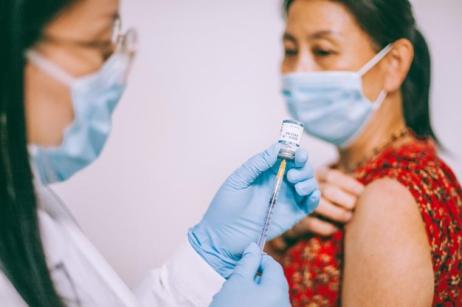- Managing your Practice
-
- Your Benefits
-

Introducing the ultimate Club MD experience
From work to play, and everything in between, we provide you with access to hundreds of deals from recognizable, best-in-class brands, elevating every facet of your life – from practice supports to entertainment, restaurants, electronics, travel, health and wellness, and more. Your Club MD membership ensures that these deals are exclusive to you, eliminating the need to search or negotiate.
Welcome to the ultimate Club MD experience. Your membership, your choices, your journey.
-
- Advocacy & Policy
-
- Collaboration
- News & Events
-

Stay Informed
Stay up to date with important information that impacts the profession and your practice. Doctors of BC provides a range of newsletters that target areas of interest to you.
Subscribe to the President's Letter
Subscribe to Newsletters
-
- About Us
-

Overcoming COVID-19 vaccine hesitancy
May 18, 2021
Together for Health
We all want to return to a normal way of life where we can get together with family and friends, travel, attend social events, and put COVID-19 behind us. And we’ve been told by scientific and medical experts that the way to do this is by reaching herd immunity – where 60-70% of the population is vaccinated and becomes immune to Covid-19, reducing the ability of the virus to spread. But to reach herd immunity, we must address the underlying issues of vaccine hesitancy that are evident among our population.
Vaccine safety scientist, Dr Julie Bettinger, says "People who are hesitant to get a vaccine may be concerned about its safety or the long-term effects, but often the underlying reason for this hesitancy is a lack of trust. Building that trust is crucial to ensuring that people who are wary about taking these vaccines know that it is a safe and healthy option for them."
Are the vaccines safe?
Feelings of worry or hesitancy are normal reactions to something “new” like the COVID-19 vaccines. But the vaccines now available to us, such as the mRNA Pfizer and Moderna vaccines and the viral vector vaccines such as AstraZeneca and Johnson & Johnson, have been thoroughly researched and tested – the safety requirements during clinical trials were as stringent as with any other vaccines. Developing these vaccines has truly been a global effort.
 In fact, variations of these types of vaccines have been around for decades and have successfully been used to prevent influenza, Ebola, Zika, rabies, cytomegalovirus (CMV), and HIV, and are used in cancer research and gene therapy.
In fact, variations of these types of vaccines have been around for decades and have successfully been used to prevent influenza, Ebola, Zika, rabies, cytomegalovirus (CMV), and HIV, and are used in cancer research and gene therapy.
As well, Health Canada’s scrupulous approval process ensures vaccine safety for all Canadians – it’s a big responsibility. That the approval process happened so quickly is a testament to the urgency of the pandemic and the ability of Health Canada to shorten its administrative and organizational process.
How can we know for sure there will be no long-term side effects?
Although we don’t yet have long-term data, the medical and scientific communities are confident in the safety of the COVID-19 vaccines. As is done for all our vaccination programs, federal and provincial public health agencies watch for safety signals – associations between a vaccine and an adverse event that warrants further investigation. The COVID-19 vaccination program is no different. Nearly one year ago, tens of thousands of volunteers world wide stepped up to participate in clinical trials to test the COVID-19 vaccines, and they will be monitored still for several years to come. So, while we don’t yet have any long-term safety data for the COVID-19 vaccines, we do know that in the short term, the vaccines are safe.
The bottom line, for a vaccine to be approved in Canada, the benefits must significantly outweigh any risk. And we know that the risks of a severe reaction if someone were to get COVID-19 are far greater than any potential side effects of a COVID-19 vaccine. Dedicated doctors and scientists around the world have been diligently working to develop COVID vaccines, studying adverse effects, and researching vaccine protection – all so that our lives can one day return to normal.
For more information visit the BC Centre for Disease Control and the Government of Canada’s COVID-19 vaccine webpage.




